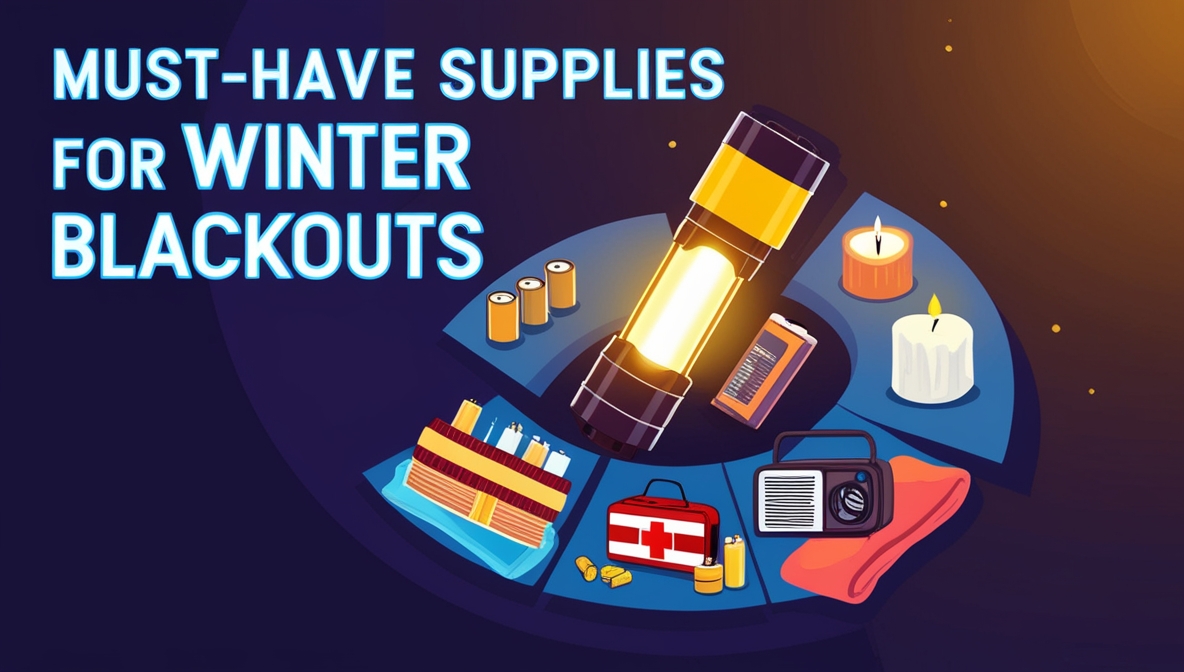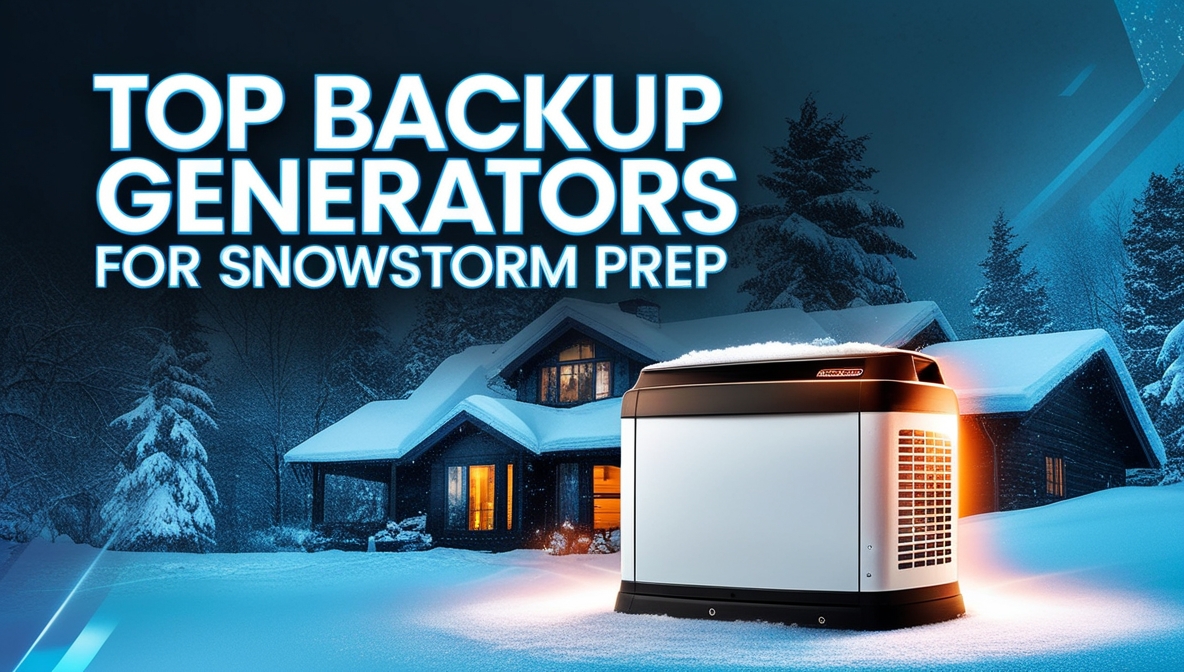Winter blackouts can be both stressful and dangerous. Harsh conditions like snowstorms and ice accumulation can easily knock out power, leaving homes without heat, lights, or ways to prepare meals. The key to enduring such situations comfortably is to be well-prepared with the right gear. Equipping your household with the proper emergency supplies for winter blackouts can keep your family safe, warm, and as comfortable as possible. This guide outlines the essential items you should have ready for the next winter storm.
1. Essential Lighting Options
When the power goes out, you’ll need a way to light your home safely. While candles may seem like an easy solution, they come with a high risk of fire. Instead, consider these options:
- LED Flashlights and Lanterns: These are safer than open flames and last longer on battery power. Keep several around the house, and don’t forget to store extra batteries.
- Headlamps: These are great for hands-free illumination, especially if you need to make repairs or move around in the dark.
- Rechargeable or Solar Lanterns: Invest in lanterns that can be charged using solar power or a hand crank. These are useful when power is out for extended periods.
Having multiple light sources is one of the most basic yet important emergency supplies for winter blackouts, ensuring you can move safely around your home.
2. Heating Supplies to Stay Warm
A lack of power can quickly make your home feel like an icebox. Staying warm is not just about comfort; it’s also about survival in freezing temperatures. Here’s how to prepare:
- Thermal Blankets and Sleeping Bags: Heavy-duty thermal blankets and sleeping bags rated for cold weather can help you stay warm even without central heating.
- Space Heaters (Battery-Operated or Propane): If you choose a propane heater, make sure it’s safe for indoor use and has built-in safety features like automatic shut-off. Always follow safety guidelines and ensure proper ventilation.
- Hand and Foot Warmers: These are inexpensive and can provide several hours of heat for your extremities, which are most susceptible to frostbite.
- Firewood and Kindling: If you have a fireplace or wood-burning stove, stock up on dry, seasoned firewood. Also, make sure your chimney or venting system is clean and functional.
3. Food and Water Supply
You never know how long a power outage will last, so having a supply of non-perishable food and clean drinking water is critical.
- Non-Perishable Food: Aim for a three-day supply of foods that require minimal or no preparation, such as canned goods, energy bars, dried fruit, and instant noodles. Don’t forget a manual can opener.
- Portable Stove or Camping Stove: These stoves, fueled by small propane or butane canisters, can help you prepare simple meals or boil water. Make sure to use them in a well-ventilated area to prevent carbon monoxide buildup.
- Water Storage: Keep at least one gallon of water per person per day for drinking and basic hygiene. You can also invest in water purification tablets or a portable water filter in case you need to purify additional water sources.
Stocking up on adequate food and water is a vital part of any list of emergency supplies for winter blackouts.
4. First Aid and Medications
In any emergency, having access to a well-stocked first aid kit can be a lifesaver. Here’s what to include:
- Basic First Aid Kit: Bandages, antiseptic wipes, gauze, adhesive tape, tweezers, scissors, and pain relievers should all be part of your kit.
- Prescription Medications: Make sure you have a minimum of a week’s supply of any necessary prescription medications, and store them in a waterproof container.
- Over-the-Counter Medications: Pain relievers, fever reducers, and remedies for upset stomachs or allergies are also good to have on hand.
Remember, during a winter blackout, emergency services may be delayed, so being prepared for minor medical issues is crucial.
5. Communication and Information Tools
Staying informed about weather updates and communicating with the outside world is critical during a power outage. Here are some must-have tools:
- Battery-Powered or Hand-Crank Radio: These radios can keep you updated on weather alerts and emergency information. Models with built-in flashlights and USB charging ports for devices are especially useful.
- Portable Phone Chargers: Power banks or solar-powered chargers can keep your phone operational. Make sure to fully charge these devices before a storm hits.
- Walkie-Talkies: In case cell service goes down, walkie-talkies can help you communicate with family members or neighbors nearby.
Having reliable communication methods is essential among your emergency supplies for winter blackouts, helping you stay informed and connected.
6. Hygiene and Sanitation
Maintaining hygiene can be difficult during a power outage, but it’s necessary to prevent illness:
- Baby Wipes and Hand Sanitizer: These are perfect for quick cleaning when water is scarce or unavailable.
- Toiletries: Don’t forget items like toothpaste, toilet paper, and a portable toilet if necessary.
- Trash Bags: Keep plenty of heavy-duty trash bags for waste management.
A lack of running water doesn’t have to compromise your hygiene if you’re well-prepared.
7. Tools and Supplies for Emergency Repairs
Sometimes, you may need to make quick fixes around your home during a blackout:
- Basic Tool Kit: A set of screwdrivers, a hammer, duct tape, and pliers can help with emergency repairs.
- Snow Shovel and Ice Melt: Keep your walkways clear of snow and ice to prevent accidents or to provide easier access for emergency services.
- Plastic Sheeting and Duct Tape: These can be used to cover broken windows or block drafts if damage occurs.
8. Backup Power Solutions
If you’re looking for a more long-term solution, consider backup power options:
- Portable Generators: These are incredibly useful but require safe fuel storage and proper operation to avoid hazards like carbon monoxide poisoning. Make sure you also have heavy-duty extension cords.
- Power Inverters: These can convert your car’s battery power into electricity to charge small devices.
- Solar Chargers: While less powerful, solar chargers are an eco-friendly way to keep your phone or small devices powered.
Investing in reliable backup power solutions can be a lifesaver during prolonged outages.
9. Special Considerations for Pets and Kids
If you have pets or young children, you’ll need to take their needs into account as well:
- Pet Supplies: Stock up on pet food, extra water, and warm bedding. Consider having a pet-safe space heater if you’re using one.
- Kid-Friendly Entertainment: Keep a stash of books, board games, or arts and crafts to keep kids entertained if there’s no power.
- Baby Supplies: If you have an infant, ensure you have an ample supply of diapers, formula, and baby food.
10. Emergency Plan and Important Documents
Finally, having a plan and keeping important documents safe is critical:
- Emergency Contact List: Have a printed list of phone numbers for family members, neighbors, and emergency services.
- Documents: Store copies of essential documents like IDs, insurance policies, and medical records in a waterproof and fireproof container.
- Evacuation Plan: Know where you’ll go and how you’ll get there if staying in your home becomes unsafe.
Final Thoughts
Winter blackouts can be unpredictable and dangerous, but having a comprehensive set of emergency supplies for winter blackouts can make a huge difference. From ensuring you have adequate light and heat to having enough food and water, being prepared is key to keeping your family safe and comfortable. Take the time to stock up on these essentials now, and you’ll be ready to face whatever the winter season brings. Stay safe and prepared!




